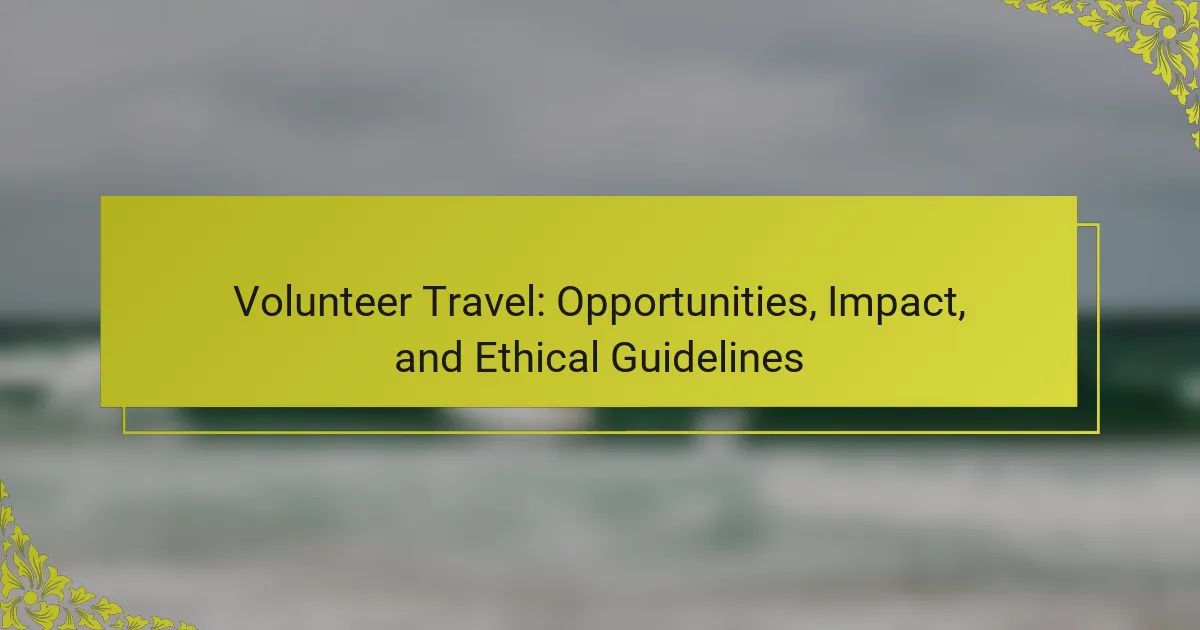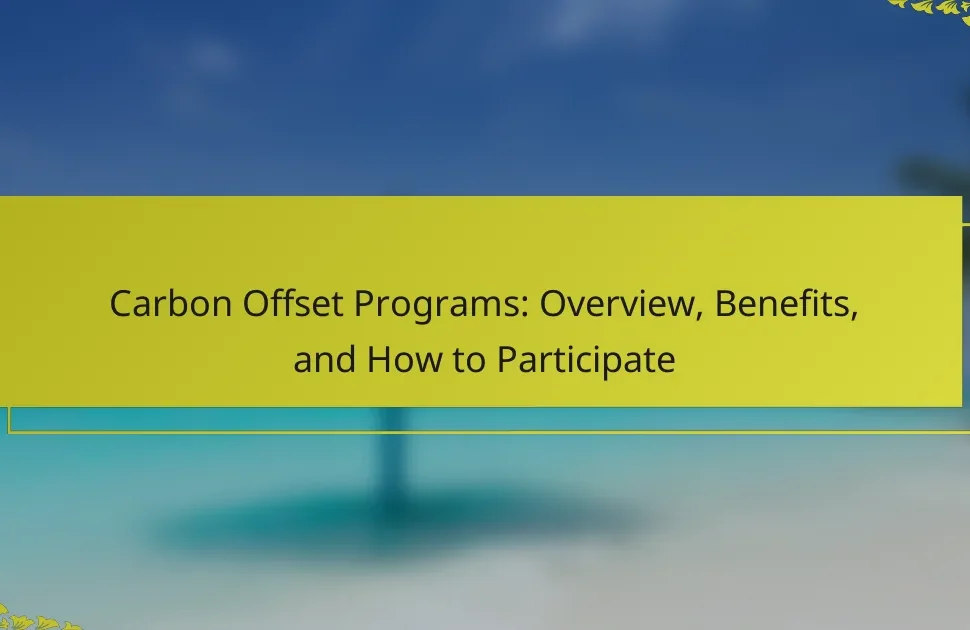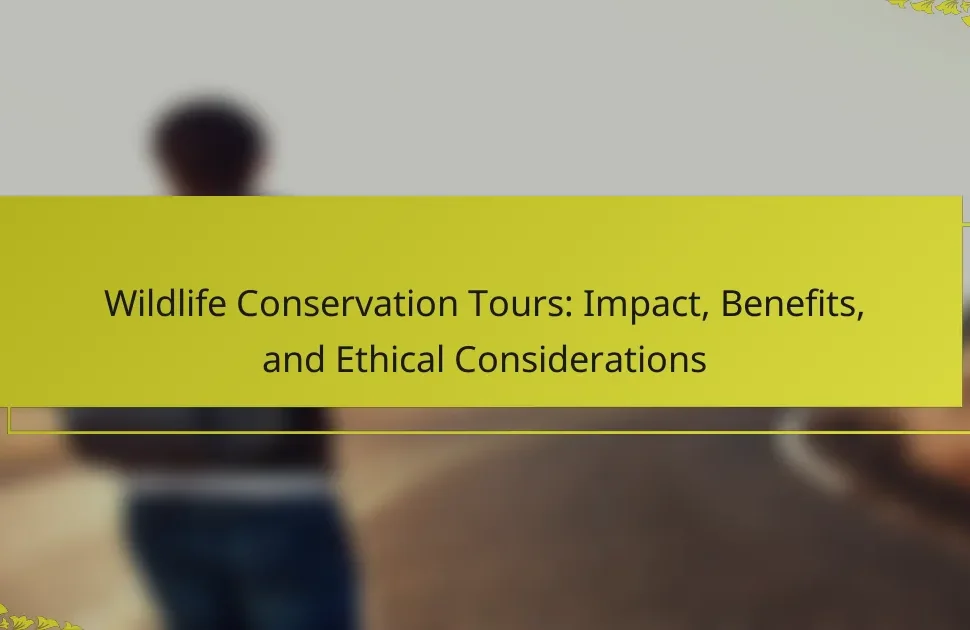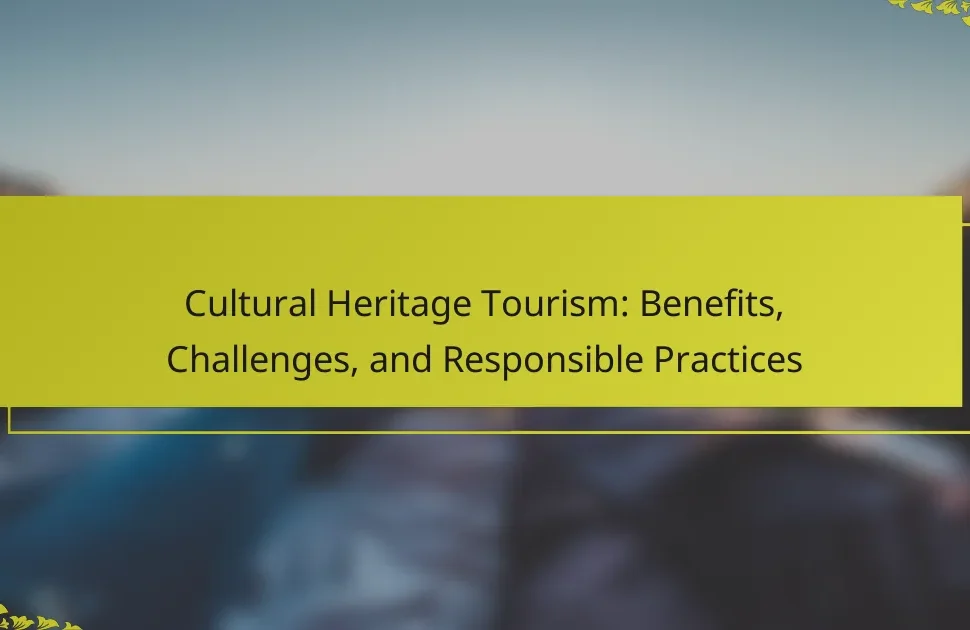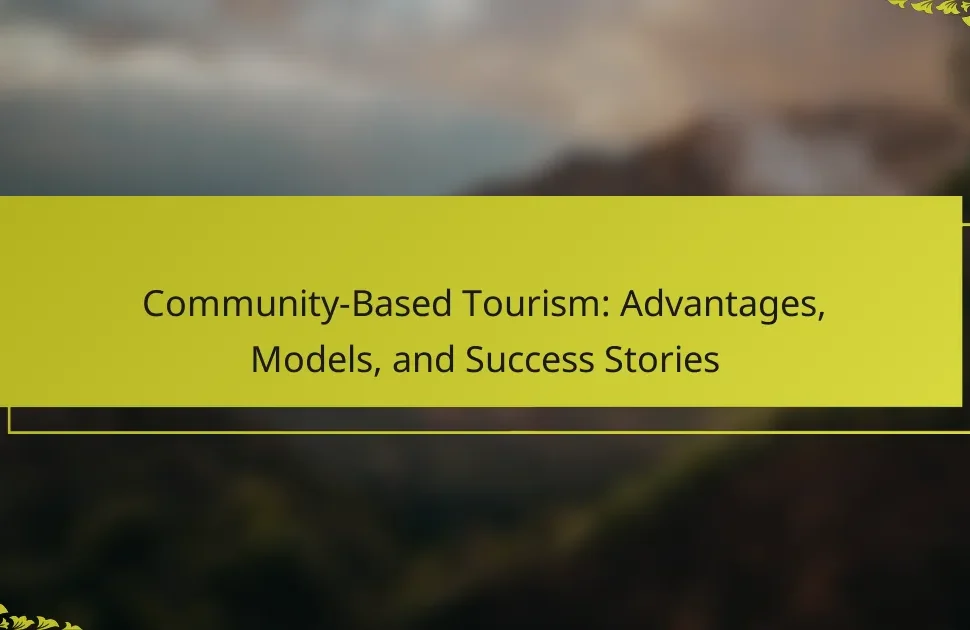Volunteer travel offers a unique opportunity for personal growth and cultural exchange while making a positive impact on communities. This article explores key motivations for volunteer travel, popular program types, and essential ethical guidelines. Understanding cultural context is vital for effective engagement, and several resources can help travelers find reputable programs. Preparing adequately enhances the overall experience for both volunteers and the communities they serve.

What are the key motivations for engaging in volunteer travel?
Key motivations for engaging in volunteer travel include personal growth, cultural exchange, and social impact. Participants often seek to develop new skills, gain unique experiences, and contribute positively to communities. The opportunity to connect with diverse cultures enhances empathy and global awareness. Additionally, many volunteers are driven by a desire to address social issues, such as education, health care, and environmental conservation. Engaging in volunteer travel often leads to lasting friendships and a sense of fulfillment through meaningful contributions.
How does volunteer travel benefit local communities?
Volunteer travel significantly benefits local communities by providing resources and support. It fosters economic growth through job creation and skill development. Volunteers often assist in education, healthcare, and infrastructure projects, enhancing local services. This collaborative effort strengthens cultural exchange and promotes community resilience, ensuring long-term impact.
What personal growth opportunities does volunteer travel offer?
Volunteer travel offers significant personal growth opportunities, including enhanced cultural awareness, improved adaptability, and increased empathy. Engaging in diverse environments fosters self-discovery and builds resilience. Participants often gain leadership skills through teamwork in challenging situations. Additionally, volunteer experiences can clarify personal values and career aspirations, leading to a more purposeful life.
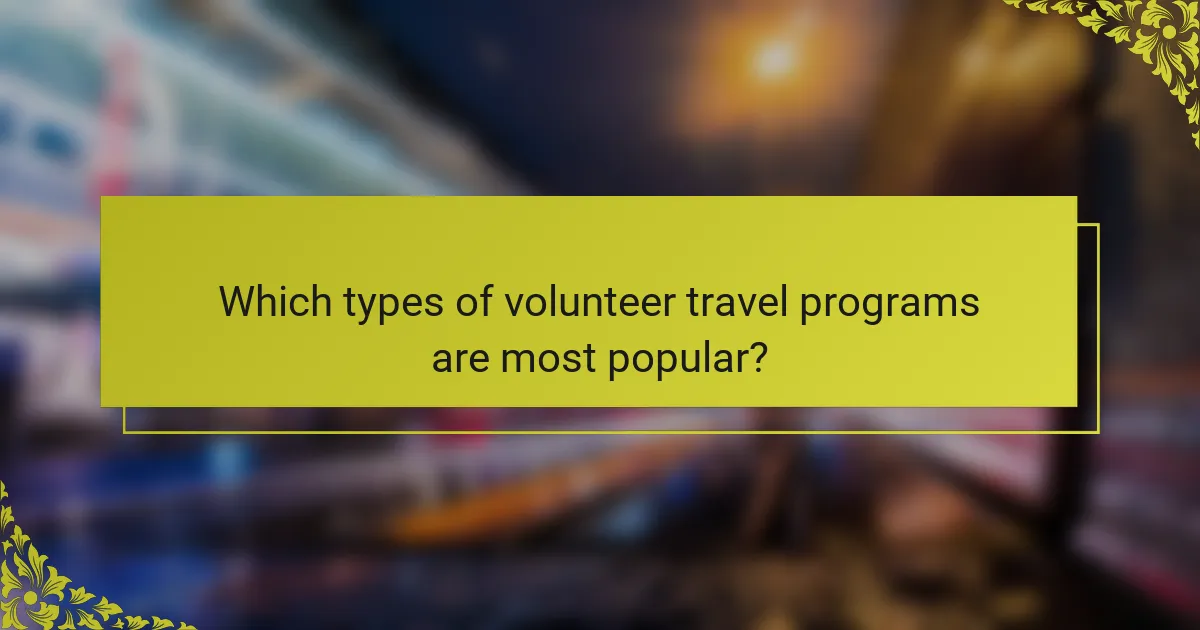
Which types of volunteer travel programs are most popular?
The most popular types of volunteer travel programs include conservation projects, community development initiatives, teaching and education roles, healthcare assistance, and wildlife rehabilitation. These programs attract volunteers due to their impactful contributions and immersive experiences. Conservation projects focus on environmental sustainability, while community development initiatives aim to improve living conditions. Teaching roles often involve language instruction, and healthcare assistance provides vital services in underserved areas. Wildlife rehabilitation programs offer hands-on experiences with animals in need.
How do conservation projects differ from community development initiatives?
Conservation projects focus on environmental protection, while community development initiatives prioritize social and economic improvements. Both aim for sustainable growth but differ in their primary objectives. Conservation projects often involve habitat restoration and wildlife protection, whereas community development initiatives enhance local infrastructure and education. Effective volunteer travel can engage participants in both areas, fostering a holistic approach to global challenges.
What are the unique characteristics of short-term versus long-term volunteer travel?
Short-term volunteer travel focuses on immediate impact and quick engagement, while long-term volunteer travel emphasizes sustained commitment and deeper community integration. Short-term opportunities typically last from a few days to a few weeks, allowing volunteers to contribute quickly and experience diverse cultures. Long-term commitments, often spanning several months to years, foster significant relationships and project continuity, enhancing the overall effectiveness of initiatives. Each type offers unique benefits; short-term travel provides flexibility, whereas long-term travel allows for profound personal growth and community transformation.

What ethical considerations should travelers keep in mind?
Travelers should prioritize ethical considerations like local community respect, environmental sustainability, and cultural sensitivity. Engaging in volunteer travel requires understanding the potential impact on communities and ecosystems.
Travelers should ensure that their efforts genuinely benefit local populations without undermining their autonomy. It’s essential to avoid volunteer placements that exploit local resources or labor. Researching organizations and projects beforehand helps in making informed decisions.
Furthermore, understanding the cultural context is crucial. This includes being aware of local customs, traditions, and social dynamics. Respectful communication and behavior foster positive relationships with community members.
Lastly, travelers should reflect on their motivations for volunteering. Genuine intent to contribute positively can enhance the overall experience for both volunteers and communities.
How can volunteers ensure they are making a positive impact?
Volunteers can ensure a positive impact by aligning their efforts with community needs and ethical practices. They should research local customs, collaborate with local organizations, and prioritize sustainable practices. Engaging in training programs enhances skills and cultural understanding, leading to more effective contributions. Regularly reflecting on their experiences helps volunteers assess their impact and make necessary adjustments.
What are the potential pitfalls of volunteer travel?
Volunteer travel can lead to several potential pitfalls, including cultural insensitivity and lack of sustainable impact. Participants may unintentionally impose their values on local communities, undermining local customs. Additionally, some programs may prioritize profit over genuine community benefit, resulting in ineffective or harmful projects. Volunteers might also face emotional challenges due to the disparity between their experiences and the realities of the communities they serve. Lastly, inadequate preparation can lead to safety concerns and a lack of meaningful engagement.
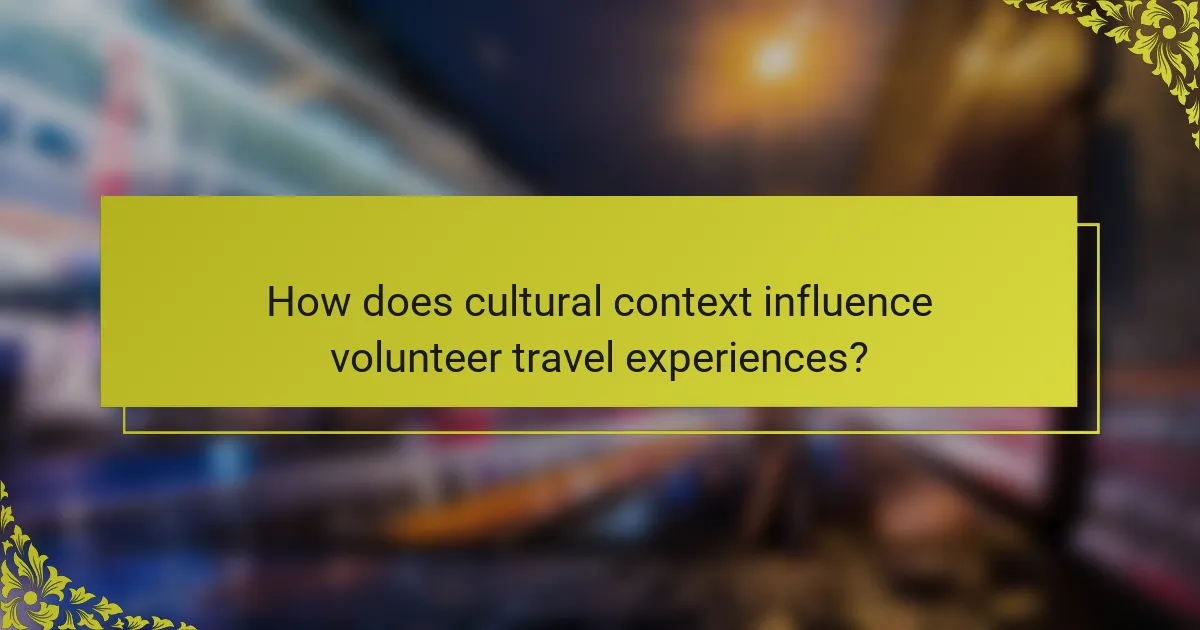
How does cultural context influence volunteer travel experiences?
Cultural context significantly shapes volunteer travel experiences by influencing motivations, interactions, and perceptions. Travelers often engage with local customs and values, which can enhance or hinder their impact.
Understanding cultural nuances fosters respect and effective communication, leading to more meaningful connections with communities. For instance, recognizing local traditions can enhance the relevance of volunteer efforts and ensure that projects align with community needs.
Moreover, cultural context can affect ethical considerations. Volunteers must navigate power dynamics and avoid perpetuating dependency. Engaging with local stakeholders ensures that initiatives are sustainable and culturally appropriate.
Ultimately, cultural context enriches volunteer travel, making it a transformative experience for both volunteers and communities.
What role do local organizations play in volunteer travel?
Local organizations play a crucial role in volunteer travel by connecting travelers with communities in need. They facilitate projects that align with local priorities, ensuring efforts are culturally relevant and sustainable. These organizations often provide logistical support, training, and resources, enhancing the overall impact of volunteer initiatives. Additionally, they foster meaningful relationships between volunteers and local residents, enriching the travel experience and promoting cultural exchange. This collaboration helps ensure that volunteer efforts genuinely benefit the community while also providing a rewarding experience for travelers.
How can travelers navigate cultural sensitivities effectively?
Travelers can navigate cultural sensitivities effectively by researching local customs, showing respect, and engaging with communities. Understanding cultural norms prevents misunderstandings and fosters positive interactions.
Familiarize yourself with local etiquette, such as greetings, dress codes, and dining practices. This knowledge demonstrates respect and enhances your experience.
Engage with local communities through volunteer opportunities. This involvement allows for deeper cultural exchange and understanding.
Be open to feedback from locals about your behavior. Such interactions can provide valuable insights into cultural nuances and sensitivities.
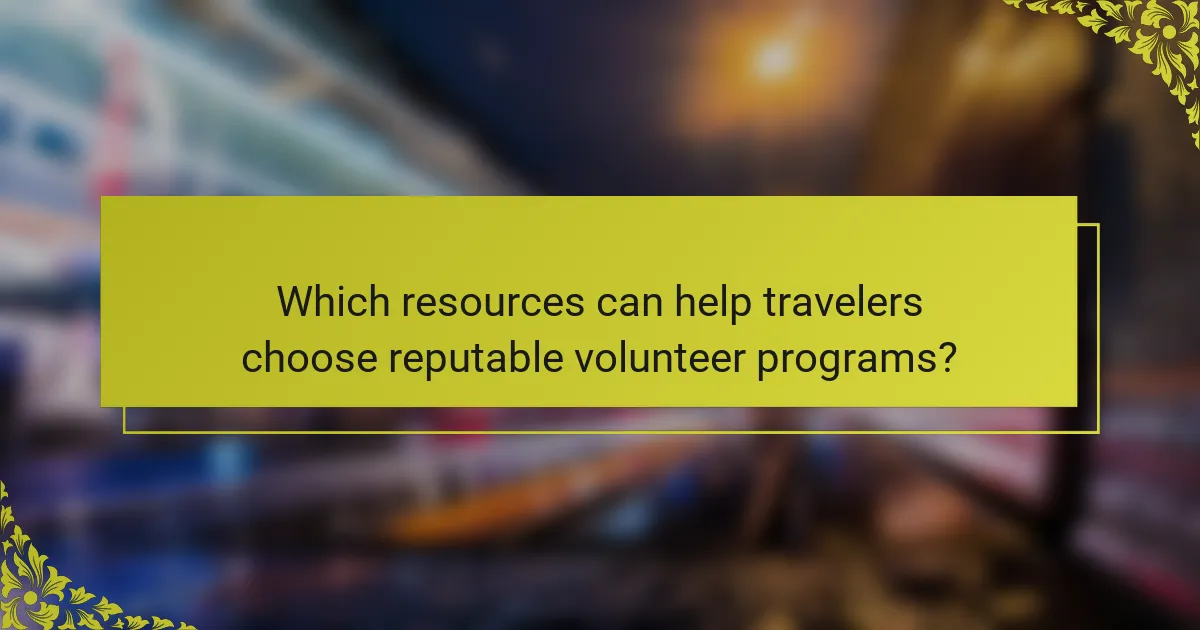
Which resources can help travelers choose reputable volunteer programs?
Travelers can utilize several resources to identify reputable volunteer programs. Websites such as VolunteerMatch and Idealist provide extensive listings and reviews. Additionally, organizations like Projects Abroad and GoAbroad offer vetted opportunities with ethical guidelines. Social media platforms allow travelers to connect with past volunteers for firsthand experiences. Lastly, travel blogs often share personal insights and recommendations, enhancing the decision-making process.
What are the signs of a well-managed volunteer organization?
A well-managed volunteer organization demonstrates clear communication, structured training, effective leadership, and measurable impact. These signs indicate efficiency and a positive environment for volunteers.
Effective recruitment strategies ensure the right volunteers join the cause. Regular feedback mechanisms foster continuous improvement. A strong sense of community enhances volunteer retention.
Additionally, ethical guidelines are followed, ensuring respect and dignity for all participants. This commitment strengthens the organization’s reputation and mission alignment.
Measuring success through specific metrics, such as volunteer hours and community impact, provides insight into the organization’s effectiveness.
How can travelers assess the sustainability of a volunteer project?
Travelers can assess the sustainability of a volunteer project by examining its environmental impact, community involvement, and ethical practices. Key factors include the project’s alignment with local needs, transparency in operations, and long-term benefits for the community. Evaluating past outcomes and participant feedback can also provide insights into the project’s effectiveness and sustainability.
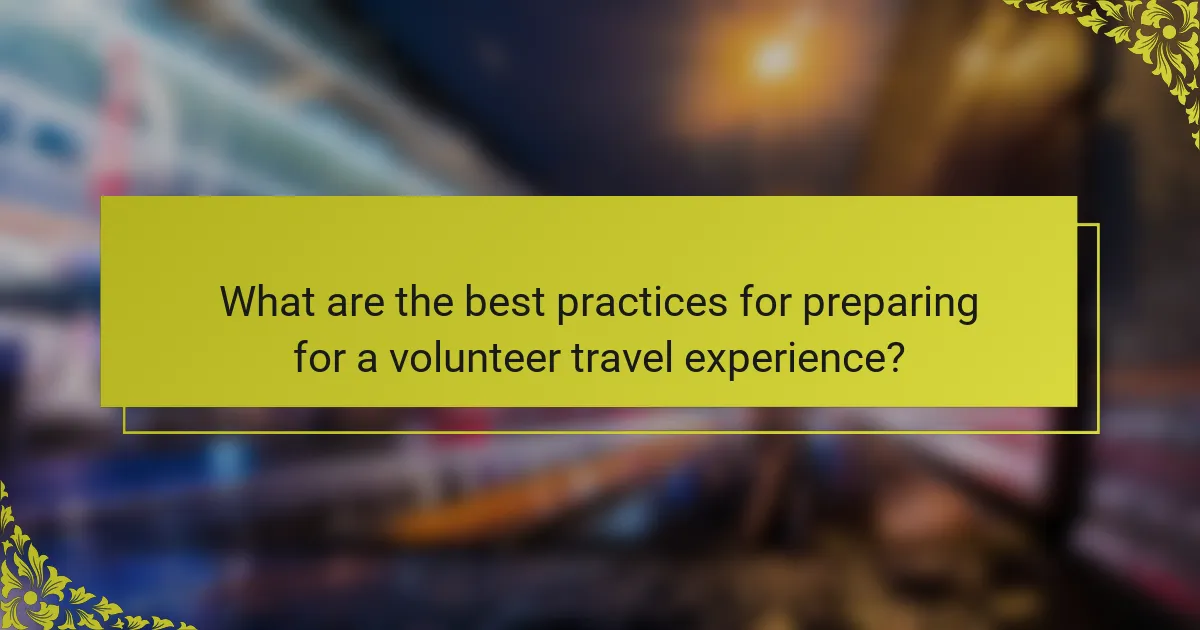
What are the best practices for preparing for a volunteer travel experience?
To prepare for a volunteer travel experience, research the destination, understand the local culture, and ensure ethical engagement. Prioritize safety, health precautions, and necessary documentation.
1. Research opportunities and organizations that align with your skills and values.
2. Familiarize yourself with local customs and languages to enhance communication.
3. Prepare necessary vaccinations and health insurance coverage.
4. Gather required travel documents, including visas and identification.
5. Pack appropriately for the climate and activities planned.
6. Set realistic expectations about your impact and experience.
How should volunteers pack for their trip?
Volunteers should pack essential items that support their work and comfort during the trip. Prioritize lightweight clothing, appropriate footwear, personal hygiene products, and any necessary tools or supplies for your specific volunteer role.
Consider packing a reusable water bottle, first aid kit, and local currency. Organize your belongings in a durable backpack for easy transport. Remember to check the weather and cultural norms of the destination to ensure appropriate attire and items.
What health and safety measures should be taken before traveling?
Before traveling for volunteer work, ensure you have the proper vaccinations, travel insurance, and health precautions in place. Research the destination’s safety guidelines, including local health risks and emergency contacts.
1. Confirm necessary vaccinations based on the destination.
2. Purchase comprehensive travel insurance covering health and emergencies.
3. Pack a health kit with essential medications and first aid supplies.
4. Stay informed about local health advisories and safety protocols.
5. Register with local authorities or your embassy for emergency support.
What common mistakes should volunteers avoid?
Volunteers should avoid common mistakes such as lack of research, poor communication, and cultural insensitivity. These errors can undermine the impact of volunteer travel and affect local communities.
1. Failing to research the organization and its needs can lead to misaligned efforts.
2. Poor communication with team members and local stakeholders can create misunderstandings.
3. Ignoring cultural norms may result in disrespect and harm relationships.
4. Overlooking personal safety and health precautions can jeopardize well-being.
5. Neglecting to reflect on personal motivations can lead to burnout or disillusionment.
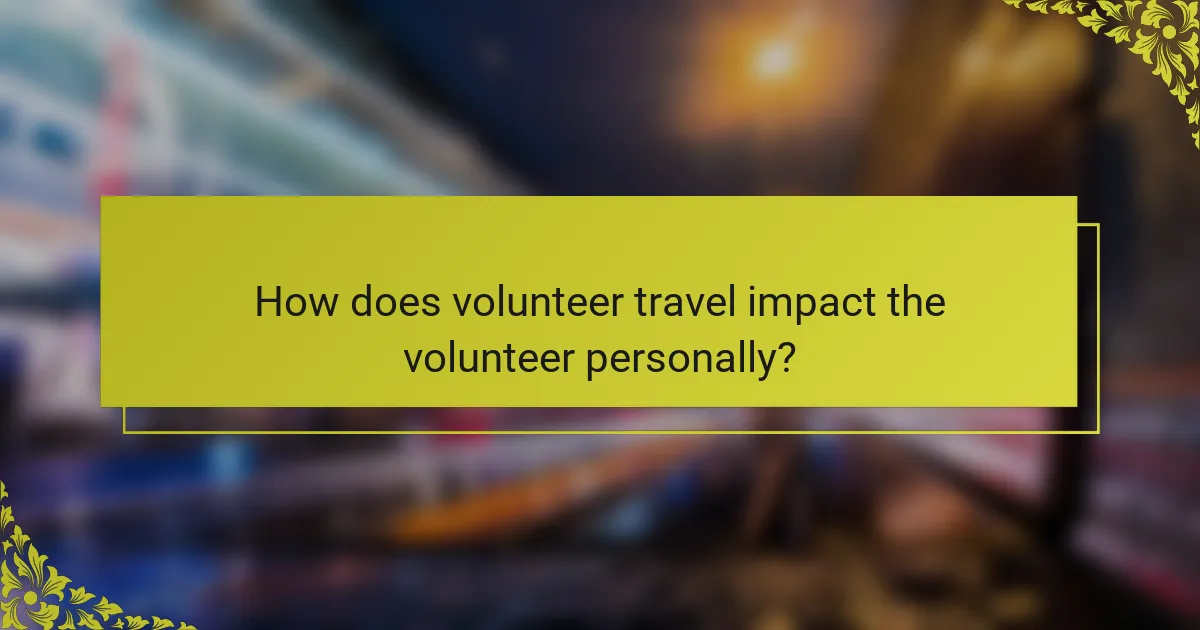
How does volunteer travel impact the volunteer personally?
Volunteer travel significantly impacts the volunteer by enhancing personal growth, cultural awareness, and skills development. Participants often experience increased empathy and a deeper understanding of global issues. Engaging with diverse communities fosters adaptability and problem-solving abilities. Additionally, volunteers frequently report a sense of fulfillment and purpose, contributing to improved mental well-being. This unique attribute of transformative experiences distinguishes volunteer travel from conventional tourism.
What skills can be developed through volunteer travel?
Volunteer travel develops skills such as cultural awareness, teamwork, problem-solving, and adaptability. Participants often enhance communication skills while engaging with diverse communities. Additionally, they may gain project management experience through organizing and executing volunteer initiatives. This unique blend of skills prepares individuals for both personal growth and professional opportunities.
How can volunteer experiences enhance one’s career prospects?
Volunteer experiences significantly enhance career prospects by providing practical skills, networking opportunities, and unique experiences. Engaging in volunteer travel allows individuals to develop leadership, communication, and problem-solving skills, which are highly valued by employers.
Moreover, volunteering fosters a sense of social responsibility and cultural awareness, qualities that are increasingly important in today’s global job market. According to a study, 85% of employers prefer candidates with volunteer experience, recognizing the commitment and adaptability it reflects.
Additionally, volunteer travel can lead to unique attributes such as international experience and language skills, which differentiate candidates in competitive job markets. As a result, these experiences can open doors to new career opportunities and enhance personal growth.
What lasting connections can be formed through volunteer travel?
Volunteer travel fosters lasting connections through shared experiences, cultural exchanges, and mutual support. Participants often form deep bonds with fellow volunteers and local communities, enhancing personal growth and empathy. These relationships can lead to long-term friendships and collaborative projects that extend beyond the travel experience. Engaging in volunteer work creates a network of like-minded individuals dedicated to making a positive impact, reinforcing a sense of global citizenship.
What are the key takeaways for maximizing the value of volunteer travel?
To maximize the value of volunteer travel, focus on meaningful engagement, cultural immersion, and ethical practices. Prioritize projects that align with local needs and leverage your skills for greater impact. Establish connections with local communities to enhance mutual understanding and respect. Research organizations thoroughly to ensure they operate ethically and sustainably.
